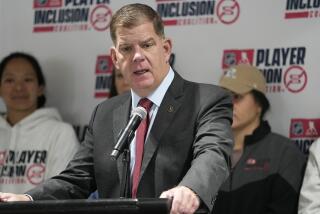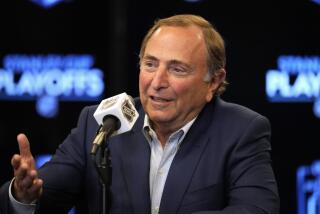NHL Talks Appear Frozen
- Share via
With the clock ticking toward a news conference scheduled by the NHL on Wednesday in New York, the lead negotiators for the league and the players’ association spent much of Monday in an apparently fruitless attempt to salvage an abbreviated season.
Early Monday, hours after the deadline Commissioner Gary Bettman had set for an agreement to be put in writing, the league contacted the union and agreed that Bill Daly, the league’s chief legal officer, and Ted Saskin, the union’s senior director, would meet on neutral ground, near Niagara Falls, Canada.
Sources said a group of top-tier players, moderate-minded owners, prominent agents and general managers had spurred both sides to continue working toward a resolution and avoid letting the NHL become the first major professional sports league in North America to cancel its season because of a labor dispute.
The outlook remained bleak, even though sources also said the league made a significant move by proposing to remove the linkage between salaries and revenues, easing the way for players to reverse course and accept a salary cap.
The meeting broke up late in the evening; the NHL soon after released a statement saying, “No progress was made in the collective bargaining process.” Daly did not elaborate. The NHLPA did not issue a statement and its spokesmen did not respond to e-mails. It’s unclear whether they will meet again today.
Early in the day, the fact Daly and Saskin had met, even though a federal mediator had been unable to steer them toward a solution on Sunday, sparked hopes that a 28-game season plus full playoffs could still be squeezed in before July.
“It is really moving forward on both fronts right now,” a source said before Daly and Saskin ended their talks. “A level of seriousness has arrived. There’s a good chance the deal is going to get done. At least the strongest and best efforts will be put forth the next 24 to 48 hours.”
The league’s announcement of Bettman’s Wednesday news conference reinforced speculation he’s preparing to cancel the season. However, the talks between Saskin and Daly, as well as backchannel conversations over the weekend among a group of players and owners concerned about the potential damage of losing the season, allowed room for speculation that Bettman might announce the formulation of a new labor deal or stop the clock and let talks continue.
Until last Friday, Bettman had prohibited club personnel from contacting players or speaking to the media about the lockout he imposed on Sept. 15. He restored the ban on Monday, but that didn’t stop a cascade of rumors and guessing about the course of the next few days and the league’s future.
“This is a pretty bad situation and it is doing the game no good,” said New Jersey Devil forward Jeff Friesen, who skated at Disney Ice in Anaheim with a small group of players Monday and was not among those involved in the weekend talks with owners. “The deals that have been offered [by the league] have not been realistic. But as far as a hard cap or luxury tax, we need something hammered out now, both sides have to realize that. They’re ruining the game.
“It’s not like they’ve been caught off guard by this. Everyone has been talking about it for five years. Let’s get it done.”
Despite their consistent opposition to a salary cap as an artificial drag on salaries, players were said to be willing to bend on that issue, provided the link between salaries and revenues is removed and the cap is set higher than in the league’s previous offers. Past proposals discussed a floating team cap of between $30 million and $42 million and pegged salaries to no more than 55 percent of league revenues.
Players have resisted linkage because they contend owners don’t accurately report revenues. NHL negotiators had said such a link was the only way to bring about the cost certainty clubs require to manage their spending and remain competitive, but Daly told a Toronto radio station last week that removing the link “was not a nonstarter” and “is a subject we could have discussion on.”
Said one source familiar with the talks: “Now that you’ve got a deadline is when you’re going to get the best offer from both sides.”
But time was clearly working against them. Bettman said last week play would have to begin before the end of the month to launch a 28-game season in which each team would play the others in its conference twice. Even a quick agreement might come too late for lawyers on both sides to approve every comma and leave a window for Bettman’s mini-season.
Cancellation of the season could irreparably harm the NHL’s already faded standing among professional sports leagues and decimate a bottom line league executives say has been depleted by $497 million in losses the past two seasons and more than $1.8 billion over the past decade under the old collective bargaining agreement.
*
(BEGIN TEXT OF INFOBOX)
Strike Forces
1992
* April 1 -- NHL players vote, 560-4, to reject the owners’ contract offer, setting into motion the first league-wide strike.
* April 11 -- Players and owners agree on a contract through the 1992-93 season. The 30 postponed games are rescheduled.
1994
* Sept. 22 -- Owners announce they will lock out players on Oct. 1, when the season is scheduled to start, if there isn’t an agreement.
1995
* Jan. 11 -- On the 103rd day of the lockout, players and owners agree to a six-year deal with a reopener after 1997-98, the fourth season. Following the cancellation of 468 games, a 48-game regular-season schedule is played.
2004
* Sept. 15 -- Owners vote unanimously to lock out players on Sept. 16, the day training camps were to start opening.
From Associated Press
More to Read
Go beyond the scoreboard
Get the latest on L.A.'s teams in the daily Sports Report newsletter.
You may occasionally receive promotional content from the Los Angeles Times.








